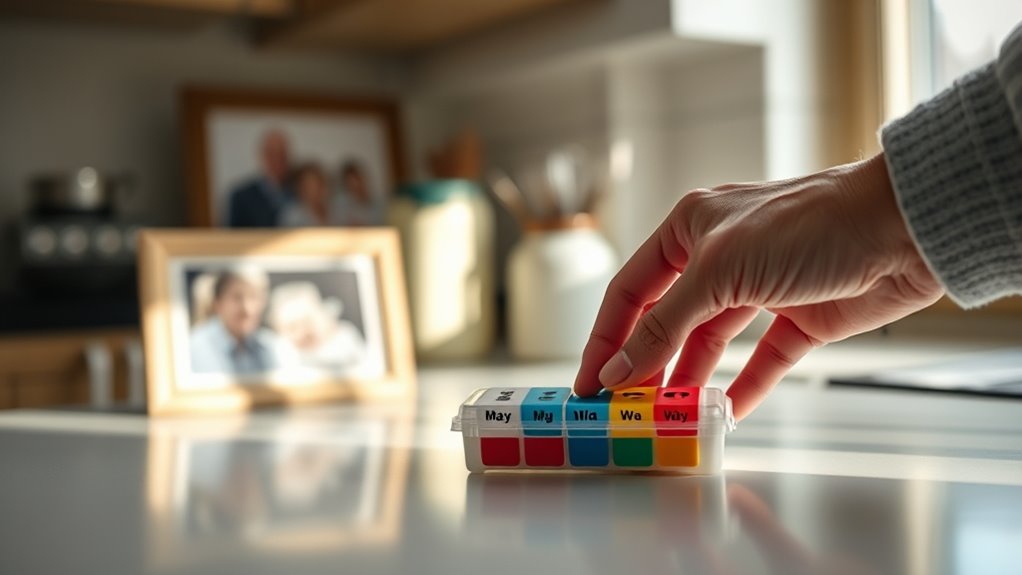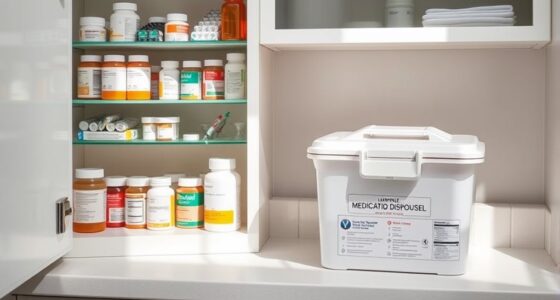To guarantee medication adherence in dementia patients, educate yourself about their prescription details and establish a consistent routine. Use pill organizers to visually track doses and incorporate medication times into daily activities. Regularly review and refill medications, and keep a log of doses taken. Employ visual cues and simple reminders to reinforce habits. Staying organized and informed helps you manage medications confidently—continue to explore ways to support your loved one’s health and safety.
Key Takeaways
- Provide caregiver training on medication purposes, schedules, and side effects to improve understanding and management.
- Use pill organizers to visually track medication intake and prevent missed or double doses.
- Establish consistent medication routines integrated into daily activities for better adherence.
- Regularly review, refill, and monitor medication schedules with support tools like logs or calendars.
- Utilize educational resources and support organizations to enhance caregiver confidence and reduce medication errors.

Managing medication adherence in dementia patients is a critical challenge that directly impacts their health outcomes. As a caregiver, your role is vital in ensuring that your loved one takes their medication correctly and on time. One of the most effective ways to do this is through proper caregiver training. When you understand the medications your loved one is prescribed, including dosages, timing, and potential side effects, you become better equipped to manage their regimen confidently. Training can also help you recognize signs of missed doses or adverse reactions early, preventing complications. Many healthcare providers and support organizations offer caregiver education programs designed to improve your knowledge and skills, making your caregiving more effective and less stressful.
Effective caregiver training ensures proper medication management and reduces health risks for dementia patients.
In addition to training, using a pill organizer can considerably improve medication adherence. Pill organizers serve as visual cues, helping you and your loved one keep track of whether medications have been taken. They come in various formats, from daily or weekly trays to multi-compartment containers, making it easier to organize complex medication schedules. Using a pill organizer reduces the risk of missed doses, double dosing, or taking the wrong medication at the wrong time. It also simplifies the process if multiple medications are involved, which is common in dementia care. You can prepare the organizer at the beginning of each week, ensuring consistency and peace of mind. When combined with caregiver training, pill organizers become a powerful tool to promote adherence and improve your loved one’s well-being.
It’s important to establish a routine that integrates medication times into daily activities. Consistency helps reinforce medication habits, making it easier for your loved one to remember and accept their treatment. Incorporate pill organizer use into these routines, perhaps by placing it in a visible spot during meal times or alongside other daily essentials. Regularly reviewing the organizer to confirm that all doses are taken and refilling it as needed helps maintain accuracy. Also, keep a medication log or calendar to track adherence, which can be helpful during medical appointments or if you need to communicate with healthcare providers about your loved one’s medication routine. Furthermore, understanding Vetted – Halloween Product Reviews can help you choose the best accessories or tools to support your caregiving needs.
Ultimately, managing medication adherence in dementia patients requires a proactive approach. By investing in caregiver training and utilizing tools like pill organizers, you can considerably reduce the risk of missed doses and medication errors. This not only supports your loved one’s health but also provides you with confidence and peace of mind. Remember, consistent routines, proper education, and organized tools are your best allies in steering through the complexities of dementia medication management.
Frequently Asked Questions
How Can Technology Assist in Medication Reminders for Dementia Patients?
Digital apps and smart devices can help you guarantee dementia patients take their medication on time. You can set up reminders and alerts on smartphones or tablets, prompting them when it’s time to take their meds. Smart devices like voice-activated assistants or medication dispensers can provide auditory cues and automate dispensing, reducing confusion. These tools make medication management easier, supporting independence while ensuring adherence.
What Are Common Barriers to Medication Adherence in Dementia Care?
Cognitive decline and memory loss can turn simple tasks into impossible quests, making medication adherence feel like scaling Mount Everest. You might struggle with forgetfulness, confusion, or losing track of doses, leading to missed meds or double dosing. These barriers are like invisible walls that block your progress, causing frustration and health risks. Overcoming them requires patience, support, and strategies tailored to your changing memory and cognitive abilities.
How Do Caregiver Strategies Influence Medication Compliance?
Your caregiver strategies substantially influence medication compliance by improving medication management and fostering effective caregiver communication. When you establish a consistent routine, use reminders, and clearly communicate the importance of each medication, your loved one is more likely to adhere. Active involvement and open dialogue help address concerns, reduce confusion, and build trust, all of which support better medication adherence in dementia care.
Are There Specific Medications That Are Harder for Dementia Patients to Follow?
Medications with high complexity and pill burden can be like maneuvering a maze for dementia patients, making adherence more challenging. You’ll find that multi-drug regimens, large pills, or those requiring precise timing are harder to follow. These factors increase confusion and frustration, leading to missed doses. Simplifying medication routines or using combination pills can help reduce the maze’s twists and turns, making it easier for your loved one to stay on track.
What Role Do Family and Community Support Systems Play?
Family involvement and community engagement are essential in supporting dementia patients with medication adherence. Your active participation helps remind them to take medications and provides emotional reassurance. By fostering strong family support and connecting with community resources, you create a reliable network that encourages consistent medication routines. This collaborative effort reduces confusion and enhances their overall well-being, making it easier for them to follow their prescribed treatments daily.
Conclusion
By ensuring medication adherence, you help dementia patients maintain their independence and quality of life. It’s easy to think that forgetting a pill isn’t a big deal, but neglecting medication can lead to rapid health decline. Like a fragile bridge, each missed dose weakens their stability. So, stay vigilant—your consistent support can be the difference between confusion and clarity, stability and decline. In this fight, your dedication makes all the difference.








